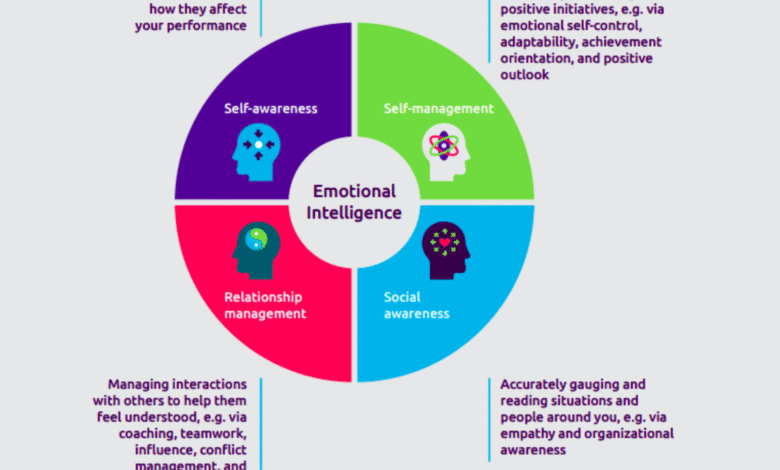AI Emotional Intelligence: Enhancing Human Connections

In today’s rapidly evolving technological landscape, AI emotional intelligence is becoming increasingly crucial for enhancing how we interact with machines. Thought leaders like Mariana Krym, COO of Vyvo Smart Chain, emphasize the role of AI as an ’emotional mirror’ that not only recognizes emotional cues but also fosters self-awareness among users. By leveraging advanced techniques like decentralized memory and real-time biometric data, Krym aims to create a technology that prioritizes user ownership and privacy while reinforcing trust in human-machine relationships. Unlike traditional AI, which focuses on task completion, this innovative approach encourages deeper emotional understanding, making it a game changer in the realm of interpersonal connections. Furthermore, as we witness the rise of Data NFTs, the potential for ethical AI interactions becomes clearer, aligning technology with our emotional needs and protecting personal data in the process.
Artificial intelligence with emotional capability, often referred to as emotional AI or affective computing, represents a significant advancement in the way machines process and respond to human emotions. Industry pioneers like Mariana Krym have highlighted the transformative potential of such technology in fostering authentic human-machine relationships, emphasizing the importance of empathetic responses over mere functional interactions. This evolution aims to merge biometric feedback and decentralized memory, paving the way for more personalized and secure experiences. By redefining ownership through innovative concepts like Data NFTs, users can take control of their emotional data, thus ensuring privacy and ethical engagement. In this paradigm shift, the focus is not only on enhancing task efficiency but also on bridging the emotional gap that exists between humans and their technological counterparts.
The Role of AI as an Emotional Mirror
AI is evolving beyond mere task execution into a complex entity capable of enhancing human emotional awareness. Mariana Krym, COO of Vyvo Smart Chain, emphasizes this transformation, describing AI as an ’emotional mirror’ that reflects not just tasks but emotional cues from users. The ability of AI to interpret these emotional signals is crucial for fostering self-awareness, allowing individuals to understand their feelings and emotional triggers better. Traditional AI, focused solely on efficiency, often misses this vital aspect of human experience. By integrating emotional intelligence into AI systems, we can create technology that aids in personal growth rather than just in productivity.
This approach positions AI as a collaborator in emotional development rather than merely a tool for completing tasks. With developments in decentralized memory, Vyvo Smart Chain envisions a future where AI does not just react but actively participates in users’ emotional journeys. This paradigm shift advocates for a deeper connection between individuals and machines, encouraging trust and ownership over personal data. Such changes challenge the norms established by previous generations of AI and highlight the need for a focus on ethical considerations, particularly concerning emotional processing and privacy.
Decentralized Memory and Its Impact on Human-Machine Relationships
Krym champions the idea that the future of AI should intersect significantly with decentralized memory systems. By leveraging real-time biometric data, Vyvo Smart Chain aims to create AI that not only remembers user preferences but also adapitates to their emotional states. This memory-based approach promises to foster richer, more intuitive interactions between humans and machines. As AI systems become increasingly adept at recognizing and responding to emotional cues, we can achieve a level of interaction that mirrors human relationships, where understanding and empathy play significant roles.
The integration of decentralized memory also raises questions about data ownership and user privacy. In stark contrast to traditional AI architectures, which often exploit user data for corporate gain, Krym’s vision emphasizes ethical data practices. By utilizing ‘Data NFTs’, users regain control over their data, ensuring that their personal memories and emotional experiences are safeguarded. This transformation in the human-machine relationship advocates for an environment where trust is paramount, enabling technology to serve individuals ethically and responsibly.
The Ethical Implications of AI Emotional Intelligence
As AI becomes more emotionally intelligent, ethical implications naturally arise. Krym argues that it is not enough for AI systems to simulate emotional understanding; they must facilitate genuine emotional processing and introspection. With the ability to analyze emotional cues and respond accordingly, AI could potentially mislead users if not designed with ethical frameworks in mind. It’s vital for developers to build trust in AI by ensuring transparency around how emotional data is processed and used, thus preventing exploitation and fostering a more collaborative human-machine dynamic.
Moreover, as AI continues to develop, the responsibilities of those creating these systems will become more complex. Regulators will need to address potential abuses of such technologies, particularly relating to data ownership and ethical usage. By promoting standards that prioritize ethical interactions, AI can serve as a beneficial tool for emotional growth rather than a source of manipulation. As Krym illustrates, leveraging Web3 technologies provides opportunities to establish decentralized consent layers that protect user privacy and enhance the integrity of human-machine relationships.
Enabling User-Centric Data Control with Data NFTs
The introduction of ‘Data NFTs’ by Vyvo Smart Chain represents a revolutionary approach to data privacy and ownership in the AI landscape. By empowering users to define the extent of access and control over their personal data, these NFTs ensure that individual privacy is upheld in a world increasingly driven by data consumption. This model not only promotes ethical interactions with AI but also cultivates trust, allowing users to engage more freely with technology, knowing that their emotional and personal data is safe.
Moreover, Data NFTs encourage a new economic paradigm where users can benefit from their data. As AI systems become more adept at emotional intelligence, the value of personal data will grow, making it essential for users to retain ownership. This new model invites users to see themselves as valuable contributors to the AI ecosystem, further emphasizing the importance of ethical AI practices. By fostering a secure environment for interaction, Vyvo Smart Chain aims to redefine the relationships people have with technology, ensuring they lead to mutually beneficial outcomes.
AI as a Collaborative Partner for Emotional Growth
Krym advocates for a vision of AI that goes beyond mere functionality, proposing a model where AI acts as a proactive partner in the journey of emotional growth. This collaborative approach means that AI not only assists users in tasks but also provides insights into their emotional well-being. As awareness of mental health rises, the demand for supportive tools that contribute to emotional development becomes increasingly important. By embedding emotional intelligence within AI, Krym believes we can foster environments where users feel secure to explore their emotional landscapes.
The notion of collaboration extends further when considering the role of decentralized memory in this dynamic. With AI designed to remember user experiences and preferences, individuals can expect tailored interactions that resonate with their emotional needs. This relationship fosters a deeper bond between the user and AI, paving the way for supportive, emotionally responsive technology that enhances overall well-being. Such a shift promotes a healthier coexistence where both human emotional experience and machine learning can thrive together.
AI’s Role in Facilitating Personal Self-Awareness
Personal self-awareness is a cornerstone of emotional intelligence, and Krym emphasizes how AI can act as a catalyst in this development. By recognizing emotional cues and patterns in behavior, AI can provide insights that help users reflect on their emotions and reactions. This process, facilitated by a memory-driven AI architecture, empowers individuals to understand their psychological states more thoroughly. As users engage with AI systems that support introspection, the journey toward self-discovery and emotional health is greatly enhanced.
Furthermore, this ongoing engagement with AI fosters an environment where users can feel safe to explore their vulnerabilities and challenges. The supportive role of AI in emotional exploration stands in stark contrast to traditional AI’s often transactional nature, allowing for a more meaningful interaction. Krym’s vision of an emotionally intelligent AI challenges us to reconsider our relationship with technology, positioning it as a tool for growth and deeper understanding of ourselves and our emotions.
Creating Trust in AI through Ethical Practices
Trust is fundamental to the user experience with AI, particularly when it involves sensitive emotional data. Krym’s insights shed light on the importance of establishing ethical practices within AI design to build this trust. Ensuring that users have clear control over their data and understanding how it is utilized can alleviate concerns surrounding privacy violations. By focusing on transparency and ethical data use, organizations can foster an atmosphere where individuals feel safe engaging with AI technologies and sharing their emotional insights.
Promoting ethical standards in AI development aligns closely with the emerging demands of users in a digital world. As AI systems prioritize user needs, the relationship between humans and machines can shift toward partnership and collaboration. This evolution is crucial for addressing the emotional challenges often experienced in traditional AI interactions. Krym stresses the need for ongoing dialogue about the ethical responsibilities developers hold in creating technologies that not only serve functional needs but also honor the emotional nuances of human experience.
Using Web3 Technologies to Enhance AI Ownership
Web3 technologies present an exciting opportunity to redefine data ownership and user agency within the AI landscape. Through the implementation of decentralized systems, users can reclaim control over their data and how it contributes to their interactions with AI. Krym supports leveraging these advancements to create more secure frameworks for personal data management. By shifting towards decentralized consent layers, the traditional data exploitation model can be disrupted, ensuring users maintain sovereignty over their emotional and personal information.
This shift not only enhances individual ownership but also solidifies the ethical foundation upon which AI technologies are built. As Krym elucidates, the future of AI hinges on building relationships defined by trust and mutual respect, enabled through user-centric design. The potential of Web3 technologies to facilitate this transformation is profound, empowering individuals to navigate their emotional journeys with assurance and control. It’s a model that can radically change the landscape of human-machine relationships, aligning technology with human values and emotional intelligence.
Frequently Asked Questions
What role does AI emotional intelligence play in human-machine relationships?
AI emotional intelligence is crucial in enhancing human-machine relationships by enabling AI systems to recognize and respond to emotional cues. This capability allows for more intuitive interactions, fostering trust and collaboration, similar to how humans engage socially. By leveraging real-time biometric data, AI emotional intelligence can facilitate better understanding and support for users, paving the way for meaningful exchanges between technology and its users.
How does Mariana Krym’s vision of AI emotional intelligence differ from traditional AI systems?
Mariana Krym’s vision of AI emotional intelligence emphasizes the role of AI as an ’emotional mirror’ that aids users in developing self-awareness rather than merely performing tasks. This approach contrasts with traditional AI systems focused solely on efficiency and productivity. By enhancing emotional processing and introspection, this AI fosters deeper human connections and establishes a more empathetic relationship between users and technology.
What are Data NFTs and how do they empower AI emotional intelligence?
Data NFTs are non-fungible tokens that represent ownership of personal data, allowing users to control their information within AI systems. In the context of AI emotional intelligence, Data NFTs promote ethical interactions by ensuring privacy and ownership, thus enabling a trusting relationship between the user and the AI. This data autonomy supports the development of emotional insights, as users can share relevant emotional data without compromising their privacy.
How does decentralized memory contribute to enhancing AI emotional intelligence?
Decentralized memory plays a key role in reinforcing AI emotional intelligence by providing a secure framework for storing and accessing user data. This architecture allows for personalized interactions that evolve over time, as AI systems can recall previous emotional states and responses. By leveraging decentralized memory, AI can facilitate a more nuanced understanding of user emotions, promoting a healthier and more cooperative human-machine relationship.
What ethical concerns arise from AI emotional intelligence and data ownership?
The integration of AI emotional intelligence raises ethical concerns about data ownership, particularly surrounding user privacy and consent. Mariana Krym highlights the necessity for regulatory frameworks to ensure users maintain control over their data. The potential misuse of emotional data and challenges in establishing trustworthy AI systems require careful consideration, emphasizing the need for frameworks that safeguard user interests while fostering collaboration between AI and humans.
How do Web3 technologies facilitate the evolution of AI emotional intelligence?
Web3 technologies provide innovative solutions for advancing AI emotional intelligence by integrating decentralized consent layers and user-owned memory systems. These advancements ensure that users have control over their emotional data, promoting trust and ethical interactions with AI. By reimagining the architecture of AI systems, Web3 enables a future where emotional understanding is prioritized, allowing for deeper and more meaningful engagements between humans and AI.
| Key Point | Explanation |
|---|---|
| AI as an ‘Emotional Mirror’ | Mariana Krym envisions AI helping users develop self-awareness by recognizing emotional cues. |
| Facilitating Emotional Processing | Krym contrasts emotional processing capabilities of AI with traditional task-focused AI, emphasizing the role AI can play in enhancing emotional introspection. |
| Importance of Trust | Krym stresses that AI must be owned by the users, linking ownership with privacy in its architecture. |
| Real-time Biometric Data | Vyvo leverages biometric data and decentralized memory to enhance emotional intelligence. |
| Enhancing Human Emotional Understanding | Krym argues that AI should improve human emotional understanding instead of simulating emotions. |
| Data NFTs for User Control | Vyvo’s architecture includes ‘Data NFTs’ to enable ethical interactions and give users control over their data. |
| Future of Collaborative AI | Krym foresees AI evolving from being merely reactive to collaborative, highlighting the importance of addressing ethical concerns around data ownership. |
| Web3 Technologies | Krym identifies Web3 technologies as potential solutions for establishing decentralized consent layers and user-owned memory systems. |
Summary
AI emotional intelligence is revolutionizing the way we understand and interact with technology. Mariana Krym’s insights highlight a future where AI not only recognizes emotional cues but also helps individuals gain deeper self-awareness. By emphasizing user ownership and ethical data practices through innovations like Data NFTs, Krym presents a vision of AI that fosters trust and meaningful relationships. In a world where emotional processing is crucial, integrating Web3 technologies can secure and enhance collaborative interactions between humans and machines.




